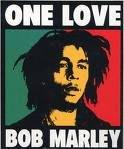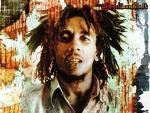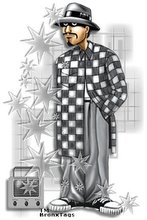Tribute Tuesday...Bob Marley
Ahoy Mense... this has to be one of the best tribute's ever.I have never felt so excited to inlighten you about someone's acheivements like i feel today! I guess people that know me will understand why... Please feel free to read the tribute and post a comment. Robert Nesta Marley was a Jamaican singer, songwriter, and guitarist. He is the most widely known performer of reggae music, and is famous for popularising the genre outside Jamaica. A faithful Rastafari, Marley is regarded by many as a prophet of the religion.

Marley (born Nesta Robert Marley) was born in the small village of Nine Miles in the Saint Ann Parish, Jamaica. His father, Norval Sinclair Marley, was a white Jamaican born in 1895 to British parents from Sussex. Norval was a Marine officer and captain, and a plantation overseer, when he married Cedella Booker, an eighteen-year-old black Jamaican, who became Bob Marley's mother. Norval provided financial support for his wife and child, but seldom saw them, as he was often away on trips. Marley was ten years old when his father died of a heart attack in 1955 at age 60.
Marley suffered racial prejudice as a youth, because of his mixed racial origins, [3] and faced questions about his own racial identity throughout his life. He once reflected:
I don't have prejudice against myself. My father was a white and my mother was black. Them call me half-caste or whatever. Me don't dip on nobody's side. Me don't dip on the black man's side nor the white man's side. Me dip on God's side, the one who create me and cause me to come from black and white.
Marley and his mother moved to Kingston's Trenchtown slum after Norval's death. He was forced to learn self-defense, as he became the target of bullying because of his racial makeup and small stature (he was 5'4" (163 cm) tall). He gained a reputation for his physical strength, which earned him the nickname "Tuff Gong".
Marley became friends with Neville "Bunny" Livingston (later known as Bunny Wailer), with whom he started to play music. He left school at the age of 14 and started as an apprentice at a local welder's shop. In his free time, he and Livingston made music with Joe Higgs, a local singer and devout Rastafari who is regarded by many as Marley's mentor. It was at a jam session with Hig
 gs and Livingston that Marley met Peter McIntosh (later known as Peter Tosh), who had similar musical ambitions.
gs and Livingston that Marley met Peter McIntosh (later known as Peter Tosh), who had similar musical ambitions.In 1962, Marley recorded his first two singles, "Judge Not" and "One Cup of Coffee", with local music producer Leslie Kong. These songs, released on the Beverley's label under the pseudonym of Bobby Martell,[4] attracted little attention. The songs were later re-released on the album Songs of Freedom, a posthumous collection of Marley's songs.
Cancer diagnosis
In July 1977, Marley was found to have malignant melanoma in a football wound on his right hallux (big toe). Marley refused amputation, citing worries that the operation would affect his dancing, as well as the Rastafari belief that the body must be "whole":
“
Rasta no abide amputation. I don't allow a man to be dismantled.
”
—From the biography Catch a Fire
Marley may have seen medical doctors as samfai. True to this belief Marley went against all surgical possibilities and sought out other means that would not break his religious beliefs. He also refused to register a will, based on the Rastafari belief that writing one acknowledged death as inevitable and disregarded the everlasting character of life.
Collapse and treatment
The cancer then spread to Marley's brain, lungs, liver, and stomach. After playing two shows at Madison Square Garden as part of his fall 1980 Uprising Tour, he collapsed while jogging in NYC's Central Park. The remainder of the tour was subsequently cancelled.
Bob Marley played his final concert at the Stanley Theater in Pittsburgh, Pennsylvania on September 23, 1980. The live version of "Redemption Song" on Songs of Freedom was recorded at this show.[5] Marley afterwards sought medical help from Munich specialist Josef Issels, but his cancer had already progressed to the terminal stage.
Death and posthumous reputation
While flying home from Germany to Jamaica for his final days, Marley became ill, and landed in Miami for immediate medical attention. He died at Cedars of Lebanon Hospital in Miami, Florida on the morning of May 11, 1981 at the age of 36. His final words to his son Ziggy were "Money can't buy life".[6] Marley received a state funeral in Jamaica, which combined elements of Ethiopian Orthodoxy and Rastafari. He was buried in a crypt near his birthplace with his Gibson Les Paul, a soccer ball, a marijuana bud, a ring that he wore everyday that was given to him by the Prince Asfa Wossen of Ethiopia (eldest son of H.I.M), and a Bible. A month before his death, he was awarded the Jamaican Order of Merit.
Bob Marley's music has continuously grown in popularity in the years since his death, providing a stream of revenue for his estate and affording him a mythical status in 20th century music history. He remains enormously popular and well-known all over the world, particularly so in Africa. Marley was inducted into the Rock and Roll Hall of Fame in 1994. Time magazine chose Bob Marley & The Wailers' Exodus as the greatest album of the 20th century.
In 2001, the same year that Marley was posthumously awarded the Grammy Lifetime Achievement Award, a feature-length documentary about his life, Rebel Music, was nominated for Best Long Form Music Video documentary at the Grammys. It won various other awards. With contributions from Rita, the Wailers, and Marley's lovers and children, it also tells much of the story in his own words.
In Summer 2006, the City of New York renamed a portion of Church Avenue from Ramsen Avenue to East 98th Street in the East Flatbush Section of Brooklyn Bob Marley Blvd.[7]
Religion
Bob Marley was a member of the Rastafari movement, whose culture was a key element in the development of reggae. Bob Marley became the leading proponent of the Rastafari, taking their music out of the socially deprived areas of Jamaica and onto the international music scene.
Now considered a "Rasta" legend, Marley's adoption of the characteristic Rastafari dreadlocks and famous use of cannabis as a sacred sacrament in the late sixties were an integral part of his persona. He is said to have entered every performance proclaiming the divinity of Jah Rastafari. 
Many of Marley's songs contained Biblical references, sometimes using wordplay to fuse activism and religion, as in "Revolution" and "Revelation":
“
Revelation, reveals the truth...
”
“
It takes a revolution to make a solution...
”
A few months before his death, Marley was baptised into the Ethiopian Orthodox Church and took the name Berhane Selassie (meaning the Light of the Holy Trinity in Amharic).

No comments:
Post a Comment